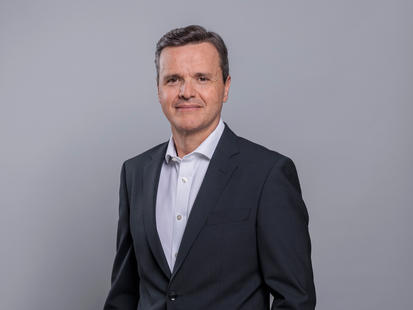
Pablo Ciano - Alumni - Sustainability Initiative
Pablo Ciano
MBA '20, CEO, DHL eCommerce
CITY |
INDUSTRY |
| Bonn, Germany | Management |
In 1997, when he was 28, Pablo Ciano went shopping for a business school. Mingling around an MBA fair in Bueno Aires, Argentina, he bypassed several well-known schools. “They felt too big and impersonal,” he recalls. “Then I met [Darden senior assistant dean of admissions] Dawna Clark and we had a wonderful conversation. It confirmed for me Darden cared for students and for quality teaching.”
The decision to come to Charlottesville, he says, was “by far the best decision of my life. I would not be where I am today if I hadn’t been a Darden grad.”
In fact, Ciano’s career—he’s spent nearly two decades at Bonn, Germany-based shipping giant DHL— is a model of how Darden prepares managers to think holistically, work globally, and act ethically. (It’s also a testament to the alumni network. Ciano got his introduction to DHL through Darden alum Scott Price ’90 who, at the time, ran DHL’s Asia Pacific operations.)
Currently, Ciano is CEO of DHL e-Commerce, a $7 billion operating group of 80,000 employees spanning 15 countries. He describes his current role as “very entrepreneurial,” driven by an active M&A pipeline. In 2023, his group acquired Turkish delivery company MNG Kargo and is in the process of integrating those operations. “It’s fun. My business unit has a lot of room for growth” globally, he says.
Before this role, the Argentine native held more than a half-dozen strategy and operations positions within DHL, starting in 2008 when he was part of the Miami-based team that restructured the DHL Express business in the U.S. At the time, the sector was losing $5 million a day. Within three years, thanks to technology upgrades and other moves, losses dropped 90% and by year five, the business broke even.
In 2021, Ciano worked closely with now-retired Deutsche Post DHL Group CEO Frank Appel to revamp the company’s sustainability roadmap. “We realized we needed to package everything we were doing to create a clear ESG (environmental, social and governance) narrative about what we believe as a company, and what we were going to focus on. We needed to convey that message to the frontline workforce”, Ciano says. The company pledged to be carbon neutral by 2030 and to invest roughly $7.5 billion over the next decade to reduce CO2 emissions.
Currently, aviation generates about 60% of DHL’s CO2 footprint. Though it is a top priority to reduce this, high cost and scarce supply have hampered DHL’s efforts to switch from fossil fuel to sustainable jet fuel, which is composed of recycled oil and agricultural byproducts. “It has become a bit of a challenge to source [sustainable fuel] because the entire industry is moving toward it. There is a stronger demand versus supply and a lack of appetite [for transition] from the oil industry,” he says.
While they wait for fuel costs to adjust, DHL is doubling down, on other efforts, Ciano says. Accordingly, all new DHL facilities are carbon neutral. The company has invested heavily in solar panels, including adding them to the US trucking fleet. In the Netherlands, all the company’s last mile vehicles are electric; by 2030, that will be true of the entire company. At present, DHL owns ten electric planes in the US, but they carry minimal cargo (roughly 2,200 pounds) and travel only short range.
Though the energy transition “will take time and is not easy,” Ciano notes, he sees positive momentum, both inside DHL and within global business in general. He thinks electric trucks and planes will become more efficient, and follow the same trajectory as solar panels, which cost 10% of what they cost a decade ago. He credits the U.S. Inflation Reduction Act (IRA)—essentially “a disguised decarbonization effort”—with providing much-needed incentives for green technology. Also, “venture capital is going into green technology and when you see that type of attractiveness for capital, it’s a strong signal,” he says.
“I feel optimistic,” Ciano says. “Five years ago, the climate was not even being discussed much in C-suites except as cosmetic ‘greenwashing’ actions, but today all companies are taking it seriously. All of us are investing in decarbonization. We have seen humanity make big changes fast when the will is there.”
But if he were to give advice to Darden students today, Ciano, a triathlete and father of four, would tell them not to focus on sustainability as a career per se. “Sustainability has an impact on every single function,” he says. “Your career path does not need to be directed at chief sustainability officer; you will have an opportunity to work on these issues no matter where you sit in the company."
Instead, he advises students seek out diverse organizations that are “ruled by ethical behaviors.” He said that DHL’s global scope— the firm operates in 220 countries—has challenged and inspired him immensely. “It has been fascinating meeting and working so many different people,” he says. “With each different job at DHL, it has been like joining a new company for everything I learned. It has been a great place to develop professionally.”